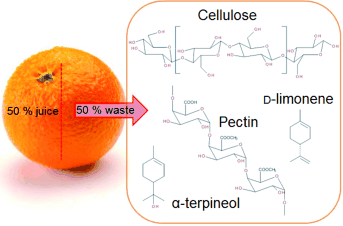/ Services
Sustainable Waste Valorisation & Waste Management
(By-products Valorisation)
(USA spelling: Valorization)
 |
Industrial processing of foods generates large amounts of solid waste/by-products and high volumes of effluents which still may contain valuable natural components. Think of fruit peels and cores; out-of specification agricultural produce; blood from slaughtering houses; stems, flowers and other plant parts not (yet considered) edible locally, and which may be normally consumed even as delicacies in other parts of the world; post-harvest physiological losses of fruit and vegetable which range between 10 and 45% (estimate, depending on produce). Think also of the natural, hygienic industrial effluents and side-streams; rejects and returns. In short, there are many valuable food sources being lost, considered waste. Yet it is not.
Further to the economic loss are the actual costs for getting rid of it: often it is cumbersome and expensive, and constitutes an environmental cost.
Thus industries, governments and other organisations search for the ideal solution of sustainable waste ‘valorisation’. That is, the creative application of product and process development to achieve commercially successful products of added value.
Waste valorisation may involve various types of treatment and processing. There are many successful examples of valorised products in the market: new food materials, sometimes making use of market repositioning (purees, pastes, mixes, juices; cut chilled or frozen vegetable and fruit pieces; new industrial materials; etc), fine-chemicals and bioactives (antioxidants, biophenols, amino acids, vitamins, natural flavours, functional proteins, pigments, etc.), natural macromolecules (cellulose, starch, lignin, lipids, plant enzymes, etc.) of high interest for the food, chemical and pharmaceutical industries; and of course also non-food materials, such as biofuels and bio-based products (biopolymers, fertilizers, lubricants, etc.). Beyond technological focus, valorisation projects are very demanding in marketing skills for making a truly successful project of sustained commercial success.
Over decades, countless resources have been devoted by the private and public sectors to the promise of valorisation. A valuable lesson is the high overall risk of project failure. Often the reason for failure lies in a ‘technology pull’ approach, disregarding the necessary ongoing market opportunity evaluation for product being valorised. Sustainable success requires the appropriate tuning-in to the market, otherwise there is high risk of ending up with a product that does not sell.
Our team at Foodlink Forum has been working on food waste management and valorisation since the 1970’s. Our uniqueness lies in the dedication to the food industrial waste problems and their solution, with the right technical-commercial experience at food multinationals.
We bring together a cross disciplinary team that bridges food technological, engineering, scientific, economic, market and regulatory borders to provide a balanced technical-commercial advice that considers regulatory limitations. Our ‘Sustainable Success Assessments’ of valorisation projects strongly contribute to screen and guide projects to sustainable commercial success. Our expertise in outsourcing food development work is very useful to find the right partners for valorisation projects. We serve to connect and coordinate with different processing partners and overcome technological barriers. Our contribution goes beyond current waste exploitation/management approaches and considers commercial and regulatory aspects to deliver truly sustainable valorised products.
Services:
Valorisation Audit
Carries out a food waste analysis in a specific line or the whole production plant to establish and prioritize alternative options for valorisation. Involves value analysis, technical, market, regulatory and economic aspects. Establishes skill and knowledge gaps which need to be filled to carry out the project. Results in a prioritised list of options with the appropriate underpinning.
Exploration of Food Valorisation Alternatives
Using our food market analysis skills, this service helps to find and evaluate different possible valorised product alternatives. Besides market aspects, considers technological and financial aspects. Carried out using market data providers and financial analysts.
Success Assessment of Valorisation Options
Applies Cooper’s Stage-Gate innovation methodology to assess project suitability through their developmental stages. Technical, market, regulatory and financial are considered to assess projected long term success.Valorisation Project Assistance
Review and analyses the client’s project plan and progress; Helps fill encountered gaps; Finds experienced (European) partners to perform the necessary project parts, which may involve technological, marketing, regulatory or financial aspects; Project coordination and integration; Problem solving.
Cases:
"I started off my career in by-products valorisation, then called ‘Waste Management’. I was researching in the USA, in the North-West fruit corner (Washington/Oregon States). The pear industry had tons of pear peels and cores to get rid of. It usually found its way as animal feed, as many other food industrial wastes do. But the fruit processing industries knew that these materials had still valuable components of commercial value. Their objective was to obtain a stable natural juice-concentrate from the pear peels and cores, which could be used as natural canning syrup of other canned fruits. This project was my responsibility. At the project conclusion we obtained a process patent, in addition to the successful process methodology for obtaining a colorless, clear and stabilized for long keepability 'natural syrup’ which is now widely used in the Western fruit processing industry to cann fruit and fruit pieces (instead of the heavy sugar syrups used before).
Another interesting valorisation project carried out was for the United Nations. I was responsible for the project plan for the valorisation for 12 different vegetables for a large agricultural cooperative in Central America. This project involved a Valorisation Audit and a Training component (basic knowledge in industrial innovation management). It resulted in a step-by-step manual for the valorisation of the 12 vegetables to be carried out as an internal company project.
Good opportunities for valorisation can be found in food industrial sectors with highly regulated hygienic processing. For example side-streams in the dairy industry contain valuable proteins, which can be further modified to obtain highly valued, functional proteins.
Valorisation projects are multiple-win projects: besides producing new valuable (food) materials, they also solve economic, environmental and social problems. Thus they contribute to better utilise our resources to feed the planet.
Dr. M.C. Kuhn, Global Project Director, Foodlink Forum
|
